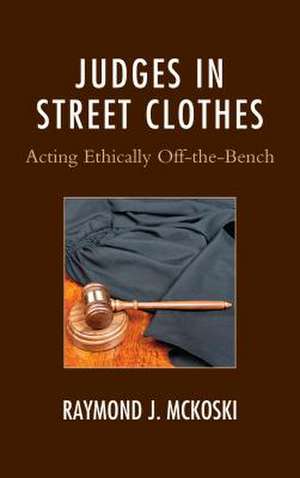JUDGES IN STREET CLOTHESACTINPB: The Fairleigh Dickinson University Press Series in Law, Culture, and the Humanities
Autor Raymond J. McKoskien Limba Engleză Paperback – 27 mai 2019
Din seria The Fairleigh Dickinson University Press Series in Law, Culture, and the Humanities
-
 Preț: 542.61 lei
Preț: 542.61 lei -
 Preț: 254.58 lei
Preț: 254.58 lei - 23%
 Preț: 456.77 lei
Preț: 456.77 lei -
 Preț: 415.17 lei
Preț: 415.17 lei -
 Preț: 348.21 lei
Preț: 348.21 lei -
 Preț: 309.62 lei
Preț: 309.62 lei -
 Preț: 426.55 lei
Preț: 426.55 lei - 27%
 Preț: 777.33 lei
Preț: 777.33 lei -
 Preț: 312.12 lei
Preț: 312.12 lei -
 Preț: 366.06 lei
Preț: 366.06 lei - 23%
 Preț: 708.48 lei
Preț: 708.48 lei - 23%
 Preț: 616.07 lei
Preț: 616.07 lei -
 Preț: 395.91 lei
Preț: 395.91 lei - 27%
 Preț: 776.06 lei
Preț: 776.06 lei - 23%
 Preț: 652.20 lei
Preț: 652.20 lei - 27%
 Preț: 726.83 lei
Preț: 726.83 lei - 23%
 Preț: 649.85 lei
Preț: 649.85 lei
Preț: 399.02 lei
Nou
Puncte Express: 599
Preț estimativ în valută:
76.37€ • 79.43$ • 63.100£
76.37€ • 79.43$ • 63.100£
Carte tipărită la comandă
Livrare economică 13-27 martie
Preluare comenzi: 021 569.72.76
Specificații
ISBN-13: 9781611479249
ISBN-10: 161147924X
Pagini: 328
Dimensiuni: 152 x 229 x 21 mm
Greutate: 0.41 kg
Editura: Rowman & Littlefield
Seria The Fairleigh Dickinson University Press Series in Law, Culture, and the Humanities
ISBN-10: 161147924X
Pagini: 328
Dimensiuni: 152 x 229 x 21 mm
Greutate: 0.41 kg
Editura: Rowman & Littlefield
Seria The Fairleigh Dickinson University Press Series in Law, Culture, and the Humanities
Notă biografică
By Raymond J. McKoski
Cuprins
Preface
1 Preliminary Considerations
2 The State¿s Interests in Restricting Extrajudicial Activities
3 The Evolution of Restrictions on the Extrajudicial Activities of Judges
4 Restrictions on the Law-Related, Educational, Religious, Charitable, Fraternal, and Civic Activities of Judges
5 Extrajudicial Activities and the First Amendment
Index
About the Author
Descriere
Judges in Street Clothes provides an historical, theoretical, and practical analysis of the ethical restrictions placed on the public lives of judges. The State's interest in maintaining an independent and impartial judiciary is considered against a judge's right to engage in educational, religious, charitable, civic, and professional activities.
